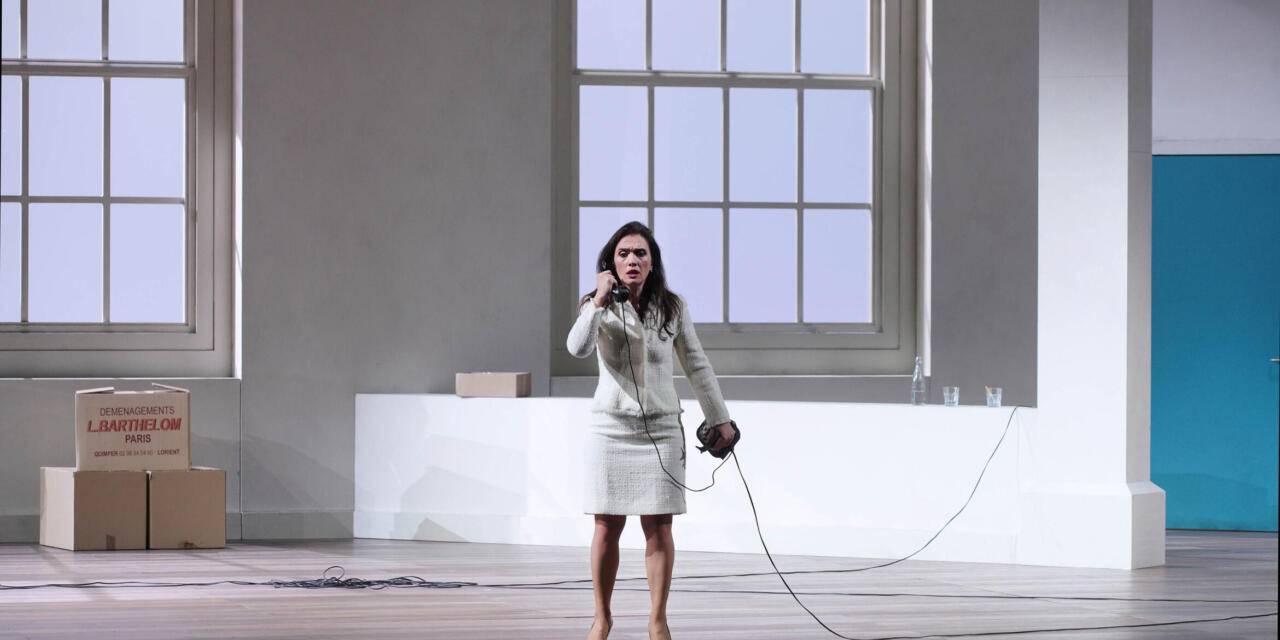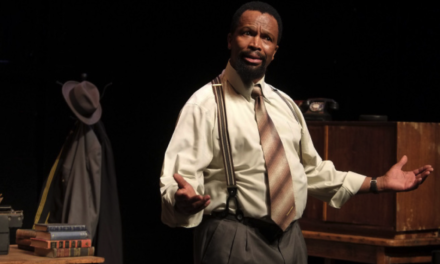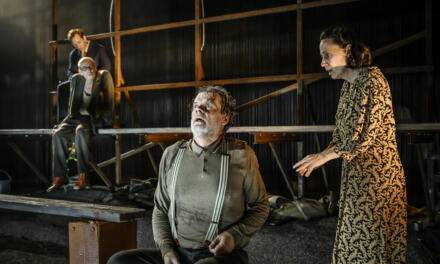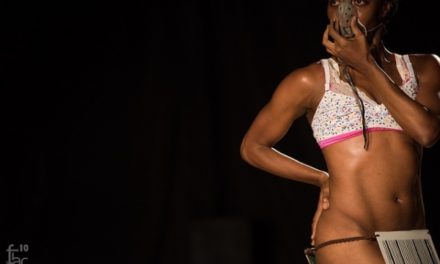There are a number of firsts in the new Teatro Real production triple bill that brings together Francis Poulenc’s La Voix Humaine (1959), adapted from Jean Cocteau’s 1930 play, and Arnold Schönberg’s Erwartung (1924) with a new piece cowritten by director Christof Loy and Almodóvar regular, the actress Rossy de Palma. These are two operatic shorts that are rarely paired, different in tone and musical style, but their programming makes great sense in that both are concerned with unrequited love that turns sour with grave consequences on the protagonists’ sanity.
A single room of high white walls and vast shuttered windows, designed by Loy with Guadalupe Holguera, provides the setting for both chamber operas. In La Voix Humaine there is just a red plastic chair (which would not look out of place in an Almodóvar film) and a number of cardboard removal boxes that points to a state of change – someone is leaving or has already left. The space looks forlorn and eerily empty with a further flash of colour delivered by a teal-coloured door. But this is conceived as a clinical antiseptic space. For Erwartung the same high-ceilinged room is filled with clutter: a rumpled bed, an untidy table, a bicycle, and sofas with more of a sense of a lived-in environment. The shutters are wide open, plants and foliage wind around the balcony. This is a space filled with things that the unnamed protagonist has to navigate – a veritable metaphor for her tangled state of mind.
Each piece becomes an embodiment of a different performance register. For La Voix Humaine’s unnamed woman, Elle (or Her) (brilliantly characterised by Ermonela Jaho), the pristine appearance — a Chanel-like white suit, heels and a tailored black coat — is soon cast aside as her mental state disintegrates. She clutches the telephone receiver with desperation, at times caressing it and times talking to it as if were an errant child. She carries the phone, a model that points to the piece’s 1950s origins, negotiating its tangled wires like a weapon, fearful of letting it go. Jaho paces, falls to the floor, kicks off her shoes and removes her jacket and coat as if preparing for battle. In the kitchenette, her friend Marthe (played by Rossy de Palma) in a smart lilac suit with her neatly tied back stands tidying. Marthe is absent in both the play and the opera and here Loy gives her a physical presence. She hovers, picking up Elle’s discarded items of clothing, amd follows her from a safe distance as if fearful of getting too close. When she does move close it is usually to perform a gesture of care: she places Elle’s jacket protectively over her shoulders and then tries to gently raise her from the floor where she has fallen in a crumpled state. It is as if Marthe dare not leave her alone.
“Darling, are you listening?” Elle sings into the receiver as the line is cut. The requests to the operator to be reconnected point to an era where operators could listen in on conversations. A culture of telephonic voyeurism is all too present, reflected both in Marthe’s onstage presence and the audience’s position listening in to a conversation where Elle looks increasingly likely to opt for a second cocktail of sleeping pills that suggest the night will end with her suicide. Elle lies on the ground writhing as if it is a bed with her lover at her side. She begins consuming a cocktail of pills, washed down with what looks like vodka. It increasingly leaves her a fragile, jittery being. “I love you,” she wails swaying unsteadily before collapsing on the floor.
Elle gives but appears to receive little in return from the anonymous figure at the end of the phone. Her passion, her emotion and honesty contrast with the silence that comes from the phone – a figure who is unable or unwilling to tell her the truth that their relationship is over. Jaho gives a performance of consummate skill: and the intense expression for which she is known and justly admired in opera houses across the world. Her physical frailty is a contrast with the voice that swerves, soars and breaks through the duration of this 40-minute piece.
Loy provides a bridge to Erwartung with a specially written monologue delivered by a lovelorn de Palma. Silencio/Silence begins with de Palma walking across the stage with an endless regal white train that occupies the entire stage. She looks somewhat like a Miss Haversham figure, although her rumination on desire, love and abandonment, however, has a comic dimension that both the Poulenc and Schönberg pieces lack. This is another approach to loss based on taking the energy and emotion of lost love and channelling it into self-love. Rossy de Palma refuses to wait like Jaho’s Elle for her lover to return. She stands tall and proud and gets on with her life. Even when she falls to the ground, there is something regal in her posture. She answers Loy back – the director’s voice pre-recorded in a conversation that suggests a female agency based on moving positively on. Unrequited love here becomes a defiant self-love.

Rossy de Palma in Silencio, directed by Christof Loy at the Teatro Real Madrid. Photo: Javier del Real.
Constructed by Loy and de Palma from texts by Ornella Vanoni, Oscar Wilde, Bertolt Brecht, Luis Fernández de Sevilla and Anselmo C. Carreño (as well as those by de Palma), Silencio is a collage of observations that are held together by de Palma’s engaging performance. The humour is self-knowing with a direct communication with the audience: she addresses them up-front, breaking the fourth wall that both the Poulenc and Schönberg pieces sternly uphold.
Loy transposes Erwartung from its abstract forest setting – replete with Freudian symbolism — to the interior room where Malin Byström’s Woman (Die Frau) frets and paces. Like Elle in La Voix Humaine, she is waiting for a lover that is absent. She strides from the bed to the garden, she closes the doors only to open them again, she puts the side light on and then switches it off again. She is as restless as Elle, only here there is no phone to cling to, no voice at the end of the line. The absence haunts the space; it is as if she is looking for something that she cannot identify. Her head darts from corner to corner, her hand holds a knife that she plunges into the emptiness around her. Erwartung’s expressionist register is here given a twist with a realist décor that roots it in the wider discourse of the mad woman in the attic, imprisoned in her own home, waiting for a Godot that may or may never appear.
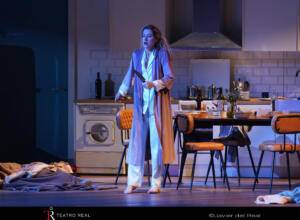
Malin Byström as Die Frau in Erwartung, directed by Christof Loy at the Teatro Real Madrid. Photo: Javier del Real.
A male corpse (Gorka Culebras) can be discerned on the floor. She cradles him and he rises like a bloodied ghost. She props him up against the wall like a rag doll; he begins to move, going to the sofa and then the table while she sings of how much she loved him. She becomes more and more animated, less and less able to focus. She screams. And then the door opens and her lover (again played by Gorka Culebras) walks through the door in suit, raincoat and briefcase. She moves towards him knife in hand as the curtain falls.
Loy directs both singers to deliver high energy performances. Jaho’s Elle may have a focal point in the telephone, but it is one that she cannot control or restore into the now distant ex-lover who has moved on. Byström’s Die Frau lunges with her knife as misguided as Don Quixote’s errant knight who mistakes windmills for giants. Both women are unable to grasp what is happening to them, unlike the stately de Palma. Barbara Drosihn dresses Byström in pyjamas signalling the somnambular dimensions of Schönberg’s opera. It is perhaps fitting that the de Palma monologue is titled Silence, the one thing that both Poulenc and Schönberg’s protagonists fear and avoid. Loy’s staging embraces the power of silence as a way of thinking through the pain of abandonment: silence as something not to be feared but rather something to be welcomed because of the potential it offers for reflection and refraction. The screams of Jaho and Byström as they call out to the absent other are met with a silence that resonates powerfully across the auditorium.
La Voix Humaine, Silencio and Erwartung at the Teatro Real Madrid on the 17, 19, 21, 23, 26 and 28 March 2024.
This post was written by the author in their personal capacity.The opinions expressed in this article are the author’s own and do not reflect the view of The Theatre Times, their staff or collaborators.
This post was written by Maria Delgado.
The views expressed here belong to the author and do not necessarily reflect our views and opinions.

